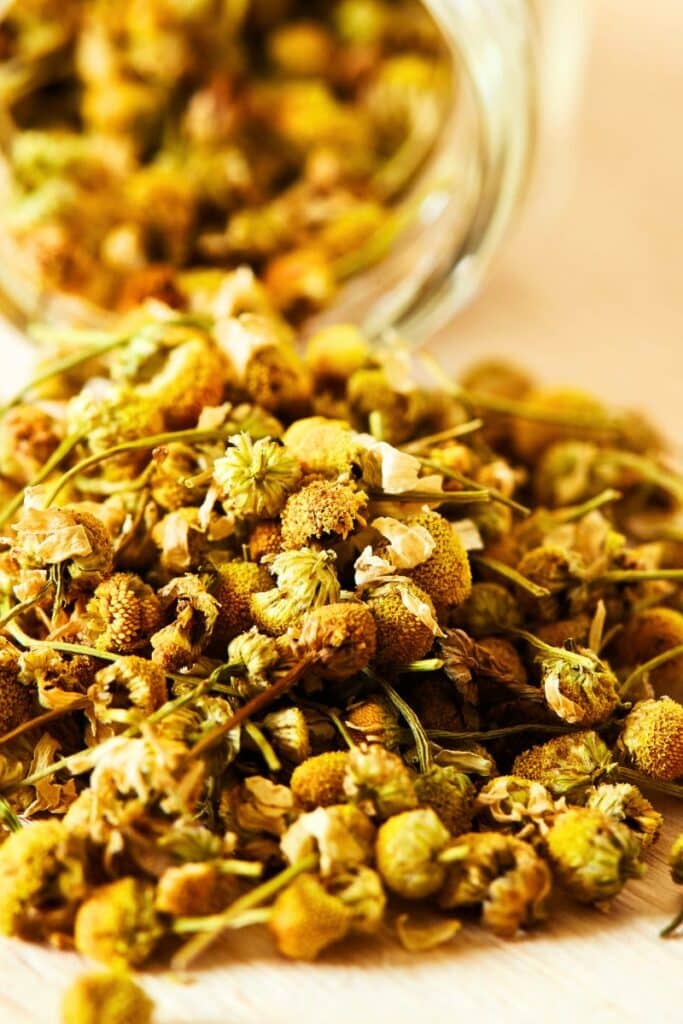Chamomile Tea For Migraine Headaches: Natural Relief
Migraines are common and can be debilitating. Chamomile Tea for Migraine Headaches - a natural remedy that many people turn to for soothing relief from the debilitating pain and discomfort associated with migraines.

Disclaimer: This is not medical advice. Information and statements shown here are for educational and informational purposes only and are not to replace the advice of your healthcare professional.
This post may include affiliate links. Please refer to our disclaimer for full disclosure.
Many people are seeking natural remedies to alleviate their pain. Chamomile tea, with its soothing properties, offers a natural way to help relieve migraine headaches. But you may be using the wrong dose...
What is Chamomile?
Chamomile is a well-known herbal tea that has been used for centuries. There are two main types of chamomile: German chamomile (Matricaria chamomilla) and Roman chamomile (Chamaemelum nobile). German chamomile is the more commonly used type in herbal teas and remedies.

Both types belong to the Asteraceae family, which includes daisies and sunflowers. Chamomile plants have small, daisy-like flowers with white petals and yellow centers, and they emit a pleasant, apple-like scent.
Properties
Chamomile is famous for its calming and soothing properties. It’s a powerful nervine, which means it helps calm the nervous system and reduce stress. This can be particularly helpful for tension headaches and migraine pain.
Chamomile also has strong anti-inflammatory properties. This means it can help reduce inflammation and swelling, which are often associated with migraine attacks. The active ingredients in chamomile include flavonoids and essential oils that contribute to its healing effects.
Historical Uses
Chamomile has a long history of use in herbal medicine, dating back to ancient times. It was used by the Egyptians, Greeks, and Romans for various ailments. The Egyptians even dedicated chamomile to their sun god, Ra, because of its healing properties. In traditional Chinese medicine, chamomile was used to improve digestion and calm the mind.
Over the centuries, chamomile has been used to treat a wide range of conditions, including upset stomach, body aches, and skin irritations. It has been particularly valued for its calming effect on the nervous system and its ability to promote better quality of sleep. People have also used chamomile to soothe minor cuts and wounds due to its anti-inflammatory and antibacterial properties.
Chamomile tea, made by steeping chamomile flowers in hot water, has become a popular home remedy for its relaxing effects and its ability to relieve headache symptoms and migraine pain. Its blend of calming and anti-inflammatory properties makes it a great option for those seeking natural headache relief.
In summary, chamomile is a versatile and powerful herb with a rich history in herbal medicine. Its calming and anti-inflammatory properties make it an effective natural remedy for migraines and other types of headaches.
Chamomile Benefits for Migraines
Scientific Evidence
Chamomile tea is a popular herbal remedy with a long history of use for treating various ailments, including migraines. Recent research and scientific evidence support its effectiveness for migraine pain relief. Studies have shown that chamomile can help reduce headache symptoms and improve the quality of life for those suffering from migraines. While more research is needed, the existing evidence suggests that chamomile is a good option for natural migraine treatment.
Anti-Inflammatory Compounds
One of the key reasons chamomile is effective for migraines is its anti-inflammatory compounds. These compounds help reduce inflammation in the blood vessels, which is a common cause of migraine pain. By reducing inflammation, chamomile can alleviate the severe pain associated with migraine attacks. This makes it a natural and gentle option for managing migraine symptoms.
Relaxation and Sleep
Chamomile is also well-known for its calming effects on the nervous system. Drinking a warm cup of chamomile tea can help relax the muscles and ease tension headaches. Chamomile promotes better sleep, which is crucial for migraine sufferers. Poor sleep can be a common migraine trigger, and improving sleep quality can help reduce the frequency and severity of migraine attacks. The calming effect of chamomile also helps reduce stress and anxiety, which are often linked to migraines.
In summary, chamomile tea is a powerful herbal remedy for migraines. Its anti-inflammatory compounds help reduce migraine symptoms, while its calming effects aid in relaxation and better sleep. These benefits make chamomile a great way to manage migraines naturally and effectively.

How to Make Chamomile Tea
Ingredients
To make a soothing cup of chamomile tea, you’ll need:
- Dried chamomile flowers or chamomile tea bags
- Hot water
- Optional: honey or lemon for added flavor
Preparation
Making chamomile tea at home is simple and quick. Here’s a step-by-step guide:
- Boil the Water: Start by boiling a cup of water. Using hot water helps to extract the beneficial compounds from the chamomile flowers.
- Prepare the Chamomile: If you are using dried chamomile flowers, measure about 1 tablespoon per cup of water. If using a tea bag, one tea bag per cup is sufficient.
- Combine and Steep: Place the dried flowers or tea bag in a cup and pour the hot water over them. Allow the tea to steep for about 5-10 minutes. The longer you steep, the stronger the tea will be.
- Strain or Remove Tea Bag: If you used dried flowers, strain them out. If you used a tea bag, simply remove it from the cup.
- Add Flavor (Optional): You can add honey or a slice of lemon to enhance the flavor of your tea.
- Enjoy: Your warm cup of chamomile tea is ready to drink. Enjoy it slowly to help relax and soothe your migraine pain.
Dosage
For migraine relief, it’s recommended to drink chamomile tea 2-3 times a day. Here are some tips for the best results:
- Regular Use: Drinking chamomile tea regularly can help manage and prevent migraine symptoms.
- Before Bed: Enjoy a cup of chamomile tea before bedtime to improve sleep quality and reduce nighttime migraines.
- At Onset of Symptoms: Drink a cup at the first sign of a migraine to help ease the headache pain and relax your muscles.
Chamomile tea is one of the best teas for providing natural migraine relief. It’s a great way to use herbal teas to manage your headaches and improve your overall well-being.
Additional Benefits of Chamomile Tea
Sun Protection
Chamomile tea can help protect your skin from sun damage. The active ingredients in chamomile, like flavonoids and essential oils, have antioxidant properties. These antioxidants help fight against the harmful effects of the sun’s rays, reducing the risk of skin damage. While chamomile tea isn't a substitute for sunscreen, drinking it regularly can provide extra protection for your skin from the inside out.
Skin Health
Chamomile tea is great for your skin. It helps achieve radiant skin by reducing redness and inflammation. This tea can soothe irritated skin and even help with conditions like eczema. The anti-inflammatory and antibacterial properties of chamomile make it effective for keeping your skin healthy and glowing. Applying cooled chamomile tea bags to your skin can reduce puffiness and dark circles under your eyes.

Digestive Health
Chamomile tea is known for its ability to soothe digestive issues. It can help with upset stomachs, bloating, and gas. Drinking a warm cup of chamomile tea after a meal can aid in digestion and prevent discomfort. This tea relaxes the muscles of your digestive tract, reducing cramps and promoting better digestion. It's a great way to keep your stomach happy and healthy.
Immune Support
Chamomile tea can also boost your immune system. The antioxidants in chamomile help fight off harmful bacteria and viruses, keeping you healthier. Regular consumption of chamomile tea can help your body fend off colds and other common illnesses. This makes chamomile tea a wonderful addition to your daily routine, especially during flu season or when you’re feeling run down.
By incorporating chamomile tea into your daily life, you can enjoy these additional benefits alongside its migraine-relief properties. It’s a simple, natural way to support your overall health and well-being.
Potential Side Effects and Precautions
Common Side Effects
While chamomile tea is generally safe, some people might experience side effects. The most common ones include:
- Skin Irritation: Some individuals may develop skin irritation when using chamomile products on their skin.
- Allergic Reactions: Chamomile can cause allergic reactions in people who are allergic to plants in the Asteraceae family, such as ragweed, marigolds, and daisies. Symptoms can include itching, swelling, and difficulty breathing.
Who Should Avoid Chamomile
Certain people should avoid using chamomile tea:
- Pregnant Women: There isn’t enough reliable information about the safety of chamomile for pregnant women. To be safe, it’s best for pregnant women to avoid using chamomile.
- Individuals with Diabetes-Related Foot Ulcers: People with diabetes-related foot ulcers should talk to their doctor before using chamomile, as it may interfere with their treatment.
- Allergic Individuals: Anyone allergic to the Asteraceae family should avoid chamomile to prevent allergic reactions.
Safe Usage Tips
To safely enjoy the benefits of chamomile tea, follow these tips:
- Patch Test: If using chamomile on your skin, do a patch test first. Apply a small amount to your skin and wait 24 hours to see if there’s any reaction.
- Consult Your Doctor: If you have any medical conditions or are taking medications, especially blood thinners, consult your doctor before using chamomile. This is important to ensure that chamomile won’t interact with your treatments.
- Follow Product Instructions: Always follow the instructions on chamomile products to avoid overuse and potential side effects. For example, if you’re drinking chamomile tea, stick to the recommended dosage.
By taking these precautions, you can safely enjoy the soothing and healing properties of chamomile tea. It’s always a good idea to be cautious and informed when adding a new herbal remedy to your routine.

Other Herbs For Migraine Headaches
Besides chamomile, there are several other herbal teas and remedies that can help with migraine headaches. Each herb has its own unique properties that may provide relief from migraine pain and other symptoms.
Ginger Tea
Ginger tea is known for its powerful anti-inflammatory properties. The active ingredient, gingerol, helps reduce inflammation and pain. Drinking ginger tea can also help with nausea, a common symptom of migraines. You can make ginger tea by steeping fresh ginger slices or using dried ginger in hot water.
Green Tea
Green tea is one of the best teas for its antioxidant properties. It contains caffeine, which can improve blood flow and reduce the severity of headache pain. However, be mindful of your caffeine intake, as too much can trigger migraines for some people. Green tea is a good option for those looking for a caffeinated tea with health benefits.
Peppermint Tea
Peppermint tea is great for relieving tension headaches and muscle tension. The active ingredient in peppermint, menthol, helps relax blood vessels and improve blood circulation. You can also use peppermint oil applied to your temples for additional relief.
Feverfew Tea
Feverfew tea has been used since ancient times for its pain-relieving properties. It’s known as "nature’s aspirin" because it can help reduce the frequency and intensity of migraines. Some studies suggest feverfew may help by reducing inflammation and preventing the constriction of blood vessels.
Willow Bark Tea
Willow bark tea is another traditional remedy, often referred to as "nature’s aspirin." It contains salicin, which has similar effects to aspirin and can help reduce headache pain. This tea is a good option for those looking for a natural alternative to over-the-counter pain relievers.
Lavender Tea
Lavender tea is known for its calming effect on the nervous system. It can help reduce stress and anxiety, which are common migraine triggers. Drinking a warm cup of lavender tea can promote relaxation and help prevent the onset of migraine headaches.
Clove Tea
Clove tea has strong anti-inflammatory and pain-relieving properties. It can help reduce the pain and discomfort associated with migraines. You can make clove tea by steeping whole cloves in hot water.
Lemon Balm Tea
Lemon balm tea is another herbal tea that helps with relaxation and reducing stress. It can also improve sleep quality, which is important for preventing migraines. Drinking lemon balm tea regularly can help manage migraine symptoms.
By incorporating these herbal teas into your routine, you can find natural relief from migraine headaches. Always remember to consult your doctor before trying new herbal remedies, especially if you have medical conditions or are taking other medications.

Conclusion
Chamomile tea is a powerful and natural remedy for migraines. It helps reduce migraine pain with its anti-inflammatory compounds and promotes relaxation and better sleep, which are crucial for migraine sufferers. Chamomile also offers additional benefits, such as sun protection, improved skin health, digestive support, and immune boosting. It’s a versatile and gentle herbal tea that can improve your overall well-being.
Incorporating chamomile tea into your daily routine can provide natural relief from migraine headaches and enhance your health. Whether you enjoy it as a warm cup of tea before bed or use it to soothe your skin, chamomile’s calming effects and health benefits make it a wonderful addition to your life.



